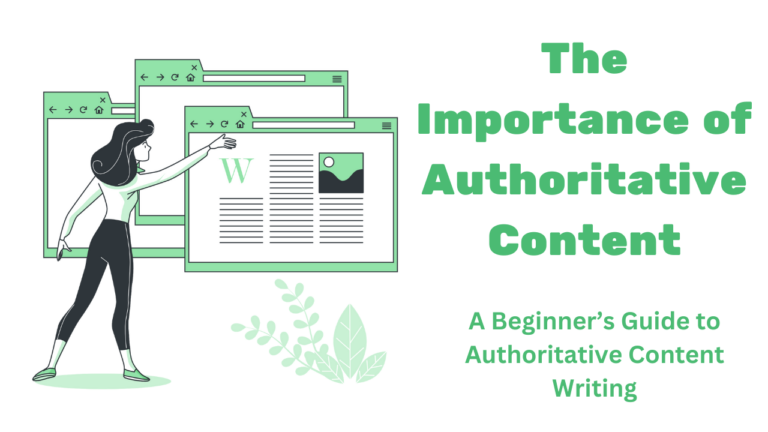

The Importance of Authoritative Content for SEO in 2024
As a writer, your goal is mainly to provide helpful and accurate answers to users’ search queries on Google and alternatives.
While case studies are the most authoritative type of content, you can use this writing technique in your blog post to increase your ranking on the search engine results page (SERP).
Search engines are constantly crawling the internet in search of the most authoritative content. It’s their way of consistently displaying relevant, valuable content responding to internet users’ search queries. And since that’s the case, the need for unique, relevant, informed content that shows subject expertise trumps content heavy in SEO.
If you want to know why and how this works, keep reading to get clued up on the importance of authoritative content.
Also read: How to detect AI-generated content.
What Do We Mean By Authoritative Content?
First of all, what is authoritative content? Simply put, authoritative content informs the readers, demonstrates subject expertise, and provides insights for their target audience.
It aligns with what users are searching for, earns engagement and backlinks, and follows SEO best practices for optimization. This content helps websites rank higher in search results and build credibility with both users and search engines.
Types of Authoritative Content
To give you a better idea, let’s have a look at the types of authoritative content. It can also help narrow down exactly what type of content to focus on if you’re keen on implementing it into your website.
Evergreen Content
This type of content can stand the test of time, retaining relevance and driving traffic long after publication. For example, a blog about “how to write a book” and most “how to for beginners guides.”
Buyer’s Guide
Content designed to help customers make an informed buying decision. These articles include features, prices, benefits, and details of a particular product or service. For example, “Top five TV buying tips” or “the best smartwatches in 2024”.
Tutorials
Content that provides practical knowledge and step-by-step instructions about a specific subject to help readers carry out a task. For example, a how-to guide, product demonstration, or fitness videos.
Video Content
Any content in video format meant to inform, educate, or entertain an audience—for example, product videos, vlogs, animation, and user-generated videos.
Blog Posts
Any written content published on a blog or informational website. For example, TreeHugger, A Cup of Jo, and MyFitnessPal blog.
Long-form Articles
This type of content is a branch of journalism with more extensive content, typically between 1,000 and 7,500 words—for example, a magazine article, blog, investigative journalism, or a trend report.
Why Is Authoritative Content So Important?
Building trust between you and your audience is vital for content marketing. This “bond” fosters long-lasting, loyal relationships to improve conversions and generate leads. This can be achieved through authoritative content, as readers will pick up your expertise in a specific subject or niche.
Your blog will essentially become their go-to spot when they need advice, direction, or guidance regarding a topic. By now, you must have noticed the words that have been bolded: trust, expertise, and authority. According to Google, these are the three vital factors in how their algorithm ranks content.
Therefore, if you want your website to rank higher, “experience, expertise, authority, and trust” (E-E-A-T) should become your new mantra when creating content. We reveal how you can apply these factors practically in the “How to create authoritative content” section below.
Why It Matters More Than SEO
Ever heard the saying “Content is King”? Well, this phrase is now more powerful than ever before. Google and the likes are moving away from traditional SEO and embracing authoritative, quality content.
A few years back, you were able to improve your website rankings simply by placing the right keywords in the right places.
However, Google and other search engines have become more sophisticated in that they’ve taught their “crawlers” to read and differentiate website text. This means that they can now “understand” text enough to determine whether they are informative, relevant, or useful.
Google is placing a heavy emphasis on powerful, well-written content grounded in facts. In most cases, this means that authority should be prioritised over search engine optimisation.
That said, it doesn’t mean you should stop optimising your meta descriptions or start slacking with keyword research. It simply means that quality content with a strong focus on authority will likely generate more traffic for your website.
How To Create Authoritative Content
Creating authoritative content is easier than it sounds, thanks to a shift in how people search online.
The main thing is to establish a balance between showcasing expertise and matching the search intent and key phrases being searched.
That said, here is a closer look at a few practical tips content strategists can use to improve their writing and SERPS results.
Demonstrate Expertise
Showcasing expertise through your content will help you appear confident, knowledgeable, and insightful. These are all elements of an authoritative voice, but if you don’t do this properly, you risk coming off as an all-knowing person with a superiority complex.
To avoid this, start by knowing your audience to the tee. Is your audience open to humour? Do they prefer formal language? This will help you figure out how to connect with them in a way that seems genuine and not forced.
Being more direct and straight to the point is how you can appear more confident, as long-winded writing with unnecessary complex words and phrases takes away from the message.
It’s also best to fact-check everything throughout your content, convey accurate information, avoid spelling errors, and reference studies and facts. All of these pointers will ensure your website is technically sound and backed up by facts while conveying expertise.
Be Trustworthy
Create content that will make your audience trust your every word. We cannot stress how important trust is between the content creator and the consumer, especially if you offer a product or service. This will also be beneficial if you want to give affiliate marketing a try.
In terms of aesthetics, you’ll want to avoid creating content that looks unorganised and plastered with distracting clickbait ads.
These sites scream scam and exude untrustworthiness. Instead, opt for more simplistic, well-thought-out, and laid-out content that appears to be crafted by a human.
Other than that, here are a few more ways to build trust with your audience:
- Ensure that each article is accredited to an author.
- Limit third-party ad placement that could distract users from your content.
- If you’re selling through your content, ensure your contact details are easy to find on your website.
- Provide customer support and FAQs if you sell products or services through your content.
- Reference any facts and link to supporting articles.
Get Recognised By Other Authoritative Sites
Being recognised by other sites with high domain authority is easily one of the best and most effective ways to gain authority. It shows Google that other content creators in your field recognise your work as authoritative.
Typically, this is achieved by getting backlinks from other authoritative sites.
One way to do this is by producing evergreen content that trusted sites and authors can reference. Try to network with other experts by sharing their work, commenting on it, or giving feedback. This is more effective than simply asking for a backlink, as this method may yield few results.
Think About Search Intent
Search intent or “user intent” is the main goal behind typing a query into a search engine. This is precisely what authoritative content aims to address. Great content no longer relies on stuffing as many keywords into your content.
Instead, it’s more about long-tail keyphrases these days. This is a result of the way we use search engines in the digital age. For example, most users utilise voice search Google’s answer box (a featured snippet) for quick, concise responses.
Use Keyword Research to Your Advantage
Keywords still play a key role (excuse the pun) in establishing authority, besides no longer being the most significant determining factor in search engine ranking. This is because keywords can show both robots and users that you convey the right search intent.
Furthermore, it indicates to Google and users that your content is relevant and addresses specific queries and pain points. When doing keyword research, try to picture yourself as the person making the inquiry— do you provide them with the information they’re looking for?
This will have a far better impact on your level of topical authority and relevance compared to just researching the keywords and phrases that are used the most.
Wrapping Up the Significance of Authoritative Content
Authoritative content underscores the importance of quality and substance. By delivering relevant, insightful, and informative content, Google and other search engines can gauge the significance of your material.
The more beneficial you are to online users, the greater your ranking on their algorithms becomes — and this should be the primary focus for content marketers. This emphasis ensures that your content not only ranks well but also resonates deeply with your audience, establishing trust and credibility over time.
By implementing the tips above, such as focusing on writing content that is evergreen or establishing trustworthiness, you’ll be able to create applicable, valuable content. This type of unique content is far more relevant and will stand the test of time.
Now is the time to create a content marketing strategy that will help your site continue to attract an audience without losing your SERP rankings.
Top Tip: If you need help producing quality authoritative content, our range of writing services is at your disposal.









